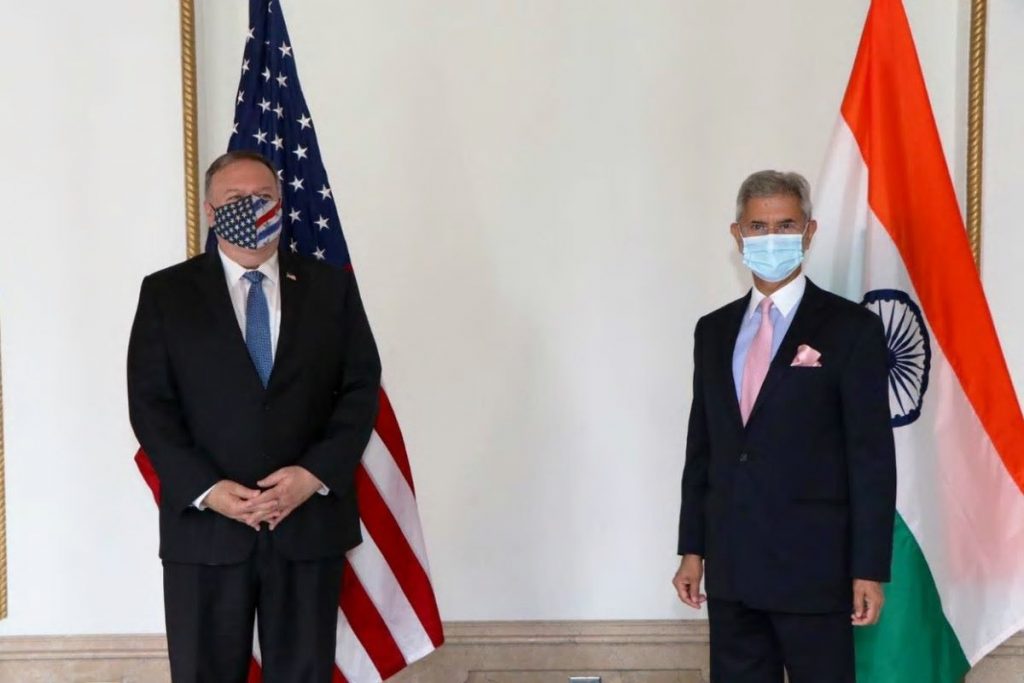Dr D.K. Giri
Foreign Ministers from four Quad countries met in Tokyo last Tuesday to discuss pandemic-related issues. At the behest of Japan, a Supply Chain Resilience Initiative (SCRI) in order to reduce dependence on China was also discussed. The new supply chain would enhance access to affordable vaccines, medicines, and medical equipment in the pandemic in addition to other goods. Japan thought that SCRI could substitute for ASEAN-led Regional Comprehensive Economic Partnership which was boycotted by India.
Quad, however, drew international attention as it raised the hackles of Beijing for refocusing on the security co-operation in order to counter China. This was conspicuous in the statement of US Secretary of State Mike Pompeo. In his scathing attack on China, Pompeo stated, “As partners in this Quad, it is more critical now than ever that we collaborate to protect our people and partners from the CCP’s exploitation, corruption and coercion we have seen in the South, in the East China Sea, the Mekong, the Himalayas, the Taiwan Straits.”
Pompeo hinted at institutionalising Quad and expanding it. Other countries sharing the spirit and the understanding with the Quad could come on board at a later time. Quad can evolve into a security framework that can counter the challenge that the Chinese Communist Party is posing to the world.
The remarks by Indian Foreign Minister S Jaishankar were astounding. He surprisingly made no reference to the five-month LAC standoff nor did he mention China. Jaishankar said, “The events of 20-20 have demonstrated the imperative for like-minded countries to coordinate responses to the various challenges that the pandemic has brought upon us. As vibrant and pluralistic democracies with shared values, our nations have collectively affirmed the importance of maintaining a free, open and inclusive Indo-Pacific.”
What are the prospects of Quad? China is already rattled by this group. The Chinese leadership has dubbed it as a mini NATO and an exclusive clique. A statement issued by their Foreign Ministry on Tuesday sounded highly critical of the Quad exercise. Beijing tends to bully countries joining the American camp. It has certainly turned aggressive against New Delhi for not reconciling to Chinese hegemony in the region and its quest for world power status. Beijing has carried a grudge for India giving asylum to the Dalai Lama and sheltering the Tibetan leadership in exile.
The Chinese animosity against India continues for the latter’s attempt to emerge as a power centre in Indo-Pacific. New Delhi moving closer to the USA exacerbates Chinese anger. Strange and incredible that New Delhi couldn’t detect the Chinese attitude towards India despite several anti-India activities it is engaged in. It behaved like the proverbial cat drinking milk with its eyes closed and thinking that nobody is watching.
It is high time New Delhi realised that it could not befriend China anymore and it has to unfriend it sooner than later. China understands the language of power and force, not persuasion, dialogue or consultation. New Delhi continues to suffer from confusion, equivocation and dithering with regard to China. Even now it seems to believe that China will roll back from the border through dialogue.
Quad provides an opportunity for India to make up its power disparity with China in alliance with other three countries. New Delhi should take greater initiative in formalising and militarising Quad, unless it makes a bilateral security agreement with the US. It seems to be opposed to militarisation of Quad, whereas the US wants to turn it into a security alliance. India’s stance defies understanding as China is already occupying 5,000 sq km of our territory. New Delhi may be calculating that if it moves into military alliances, Beijing might declare a war on India. Precisely for such an eventuality, a military alliance is necessary to defend our territory.
To sum up, Quad meeting in Tokyo sounds promising. The determination shown by Australia, USA and even Japan is encouraging. But it is New Delhi’s ambivalent attitude that disappoints. New Delhi continues to try to be neutral and friendly with both the blocks as it did in the past between USA and USSR with a tilt towards the latter. It tries to do the same between the US and China with a bias towards the former. Will it work?
The writer is Professor of International Relations, JMI. INFA
